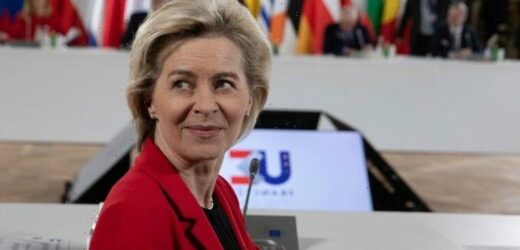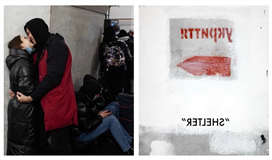EU 'made themselves dependent' on Russian gas says Portillo
We use your sign-up to provide content in ways you’ve consented to and to improve our understanding of you. This may include adverts from us and 3rd parties based on our understanding. You can unsubscribe at any time. More info
Finland and Bulgaria also opposed measures put forward by the European Commission. At a summit in Versailles, the bloc acknowledged the “tectonic shift in European history” caused by Russia’s invasion of Ukraine and vowed to “strengthen our bonds and deepen our partnership” with Kyiv. But they could not see eye-to-eye on a new energy strategy that was published on Tuesday.
It detailed how the bloc can slash its dependence on gas by up to two-thirds in 2022, and completely rid itself of Russian supplies by the end of the decade.
But the bloc currently relies on Russia for 40 percent of its gas, some nations fear they will not be able to cope without Russian imports.
More than 25 percent of the EU’s oil imports and 46 percent of its coal imports are also supplied by Russia.
German Chancellor Olaf Scholz appeared to hold one of the strongest stances against the plan, given that Germany received 55 percent of its gas from Russia, roughly 140 billion cubic meters (bcm) in 2021.
Germany also imports 35 percent of its crude oil and 50 percent of its coal from Russia.


Even before the new energy strategy was published, Mr Scholz admitted that Germany would not be able to cope without Russian gas.
The country is still staunchly opposing any sanctions on Russian energy.
Vice-chancellor Robert Habeck warned this would pose a threat to “social peace” in the country and create a “real danger of energy undersupply in certain sectors”.
Instead, Mr Scholz made the case for more specifically targeted sanctions to pressure Russia and to avoid the impact it would have on EU citizens.
But Germany is not the only country that is unwilling to part ways with Russia.

Hungary was unconvinced by the EU plot, with Prime Minister Viktor Orbán saying would oppose energy sanctions at the EU level.
Mr Orbán said on Tuesday after the strategy was published: “While we condemn Russia’s armed offensive and we also condemn the war, we will not allow Hungarian families to be made to pay the price.”
Austria was also staunchly opposed to the plan to sanction Russian energy, perhaps unsurprisingly as 80 percent of its gas is supplied by Russia.
Bulgaria, which gets 70 percent of its from Russia, is also worried about the impacts of energy sanctions on Russia, while Finland too appears unprepared to slash ties.
DON’T MISS
Xi Jinping on path to conflict with Putin as China could STARVE [REVEAL]
Chernobyl crisis: Lukashenko turns on Putin to secure nuclear plant [REPORT]
Brexit Britain goes ’full steam ahead’ with £6bn Five Eyes plan [INSIGHT]

But internal division within the bloc was laid bare as other countries like Lativa, Poland and Lithuania urged that harsh sanctions on Russian energy should be slapped down immediately.
Latvian Prime Minister Krisjanis Karin said: “I am convinced that we should make a decision to stop energy imports from Russia to get Putin to the negotiating table and end this war.”
Poland has also appeared to be one of the biggest advocates of the strategy, arguing that the urgent need to stop Putin is worth the potential economic damage it may cause to the bloc.
A Polish diplomat said: “Billions are flowing to Russia via Nord Stream 1.

“These are billions for which today Ukrainians are paying with their own blood.”
Nord Stream 1 is a major pipeline linking Russia to Germany.
France has also said it is ready to impose energy sanctions on Russia.
Trade minister Franck Riester said: “France is ready to take additional decisions to put pressure on Russia if necessary”.
“We are not closing any doors, we simply have to look at what is effective in putting pressure on Russia and also taking into account the consequences that this may have on the EU and its various members.”
Source: Read Full Article


